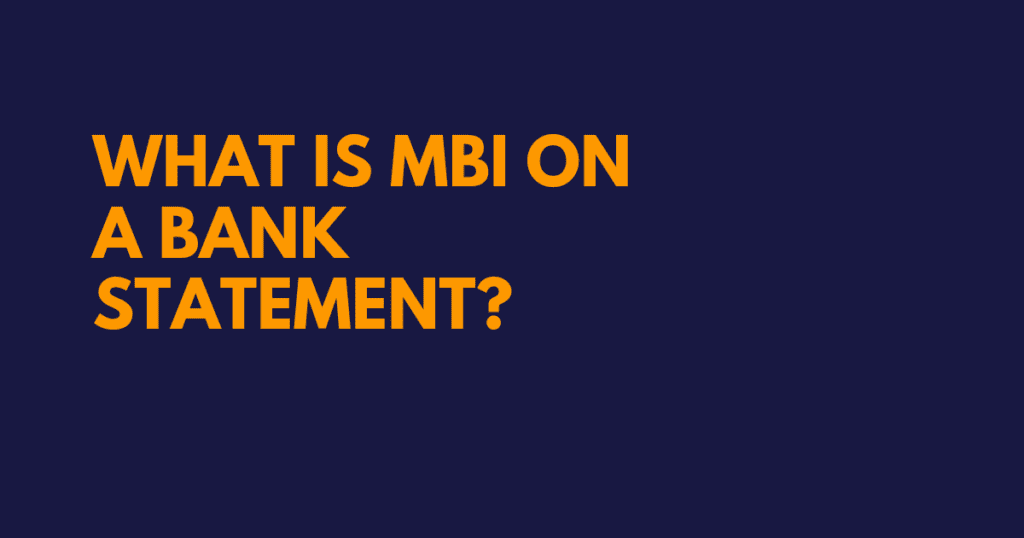What Is MBI on a Bank Statement?
Bank statements can often be riddled with abbreviations and codes that seem cryptic. One such term you might come across is MBI. But what exactly does MBI on a bank statement mean? Understanding this can help you keep better track of your finances and avoid any confusion. In this article, we’ll demystify MBI and explain why you might see it on your bank statement.

Understanding MBI
MBI stands for “Medicare Beneficiary Identifier.” This identifier is used primarily for transactions related to Medicare payments or adjustments. If you or someone in your household receives Medicare benefits, you might notice MBI appearing on your bank statement. This can include payments from Medicare, refunds, or adjustments to your account.
Why Does MBI Appear on Your Bank Statement?
MBI can show up on your bank statement for several reasons:
- Medicare Payments: If you’re a Medicare beneficiary, MBI might appear when Medicare makes payments to your account, such as reimbursements for medical expenses.
- Refunds or Adjustments: Sometimes, Medicare might issue refunds or adjustments, which would also be labeled with MBI.
- Automatic Transfers: For those who receive regular benefits from Medicare, MBI might be used to identify automatic transfers or deposits related to these benefits.
It’s essential to note that MBI is tied to Medicare-related financial activities. If you do not have Medicare, or if the transactions labeled with MBI seem unfamiliar, it might be worth investigating further.
How to Verify MBI Transactions
If you see MBI on your bank statement and are unsure about the transaction, follow these steps to verify it:
- Check Your Medicare Records: Review your Medicare account or any correspondence you’ve received. This might provide details about the transactions.
- Contact Your Bank: Reach out to your bank’s customer service for more information about the transaction. They can help clarify why MBI appears on your statement.
- Consult with Medicare: If you’re still unsure, contact Medicare directly. They can provide information about any payments or adjustments made to your account.
Other Common Meanings on Bank Statements
Just like MBI, there are several other abbreviations you might encounter on your bank statement. Understanding these can help you manage your finances more effectively. For example, AEIS often appears on statements and relates to automated electronic transfers.
Another common term is SQ, which stands for Square, a payment processor used by many businesses.
Conclusion
Seeing MBI on your bank statement can initially be confusing, but it’s typically linked to Medicare-related transactions. By understanding what MBI represents, you can better manage and track your finances. Always verify any unfamiliar transactions to ensure your account’s accuracy and security.
For more insights into bank statement codes and abbreviations, explore our articles on AEIS and SQ.
Feel free to share your experiences or questions about other bank statement abbreviations in the comments below. We’re here to help you navigate your financial journey with confidence!
FAQs
1. What does MBI stand for on a bank statement?
MBI stands for Medicare Beneficiary Identifier. It typically appears on bank statements to denote transactions related to Medicare payments or adjustments.
2. Why does MBI appear on my bank statement?
MBI may appear on your bank statement for several reasons:
- Medicare Payments: Direct deposits or payments from Medicare.
- Refunds: Refunds issued by Medicare for overpayments or adjustments.
- Automatic Transfers: Recurring Medicare benefit payments.
3. How can I verify the MBI transaction on my bank statement?
To verify an MBI transaction:
- Review Your Medicare Account: Check your Medicare account or recent statements for details.
- Contact Your Bank: Reach out to your bank’s customer service for transaction specifics.
- Consult Medicare: Call Medicare directly for information on payments or refunds made to your account.
4. I’m not a Medicare beneficiary. Why do I see MBI on my statement?
If you’re not a Medicare beneficiary, seeing MBI on your bank statement could be an error. Contact your bank immediately to investigate the transaction and ensure there’s no fraudulent activity.
5. What should I do if the MBI transaction amount doesn’t match my Medicare records?
If the amount labeled as MBI doesn’t align with your Medicare records:
- Compare Records: Cross-check the amount with your Medicare statements.
- Report Discrepancies: Contact Medicare to report the discrepancy and seek clarification.
- Inform Your Bank: Notify your bank about any inconsistencies for further investigation.
6. Are there any fees associated with MBI transactions?
Generally, MBI transactions do not involve fees. They are direct payments, refunds, or adjustments from Medicare. If you notice a fee, confirm it with your bank and Medicare to understand its nature.
7. Can MBI appear for transactions unrelated to Medicare?
MBI is specifically associated with Medicare. If you see MBI for unrelated transactions, contact your bank to verify and correct any potential errors.
8. How often might I see MBI on my bank statement?
You might see MBI periodically if you receive regular Medicare payments or occasionally for refunds and adjustments. The frequency depends on your interactions with Medicare.




